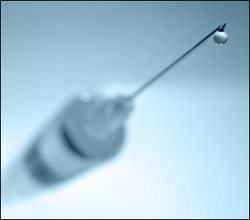What's in that puppy shot ?

Your puppy has received vaccinations from the breeder which cover a variety of diseases common to puppies and dogs. These will be noted on the Medical Record sheet provided with your puppy and you should be sure to take this information with you for the puppy’s first vet visit.
The shots are listed as a series of letters which can be confusing to the new owner as to what illnesses their pup is protected against. Below is a list of the illnesses generally covered in these vaccinations.
Distemper and Hepatitis: Distemper is a highly contagious illness that can be fatal. Some signs of distemper are weight loss, discharge from the nose and eyes, and seizures. It is a virus which can affect the visual nerves and heart muscles. Tooth discoloration can also occur. The hepatitis vaccine is generally combined with the distemper inoculation.
Leptospirosis: This is a bacterial disease affecting animals and is generally spread through urine. Lepto can be transmitted to humans from other animals and rodents in the kennel area can often infect dogs. Two types of Lepto are generally included in the vaccine. Symptoms are vomiting, diarrhea, fever, kidney damage, and ulcers in the mouth. Lepto is often excluded from the earliest puppy shots and given in the later ones.
Parainfluenza, Adenovirus Type 2, & Bordetella: These are three of many types of viruses and bacteria commonly known as Kennel Cough. These three are the only ones there are vaccines for and still don’t give total protection to the dog. Clean living quarters, regular immunization, and avoiding contact with an excessive amount of other dogs (from shelters or at boarding kennels) is the best way to keep your puppy healthy.
Parvovirus and Coronavirus: Both diseases are viruses and highly contagious affecting all breeds and are particularly deadly to puppies. The virus can live in the environment for up to three years. Symptoms are diarrhea and vomiting which quickly leads to dehydration. Blood is often seen in the loose stools and vomit. Prompt attention by a veterinarian is necessary. A separate vaccine for just Parvo and Corona is available and it is often recommended that young dogs be boosted with the vaccine every 6 months. However new protocols are out regarding vaccines so be sure to discuss this with your puppy’s veterinarian. If you have had a dog with either of these diseases, be certain that the environment and home are well disinfected before bringing in a new puppy.
